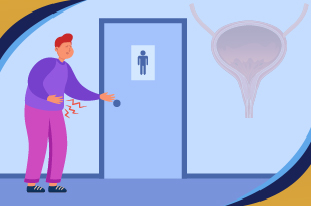One of the most overlooked symptoms of ADHD, a neurodivergent disorder, is emotional dysregulation. If you are wondering if you have been feeling like you have been experiencing a constant change in your emotions, then don’t waste a second in reading this blog. It is because we are going to talk about emotional dysregulation in ADHD, so let’s learn more about these ADHD emotions.
What is ADHD?
ADHD, or attention-deficit/hyperactivity disorder, is essentially a neurodivergent disorder. It is defined by symptoms such as restlessness, procrastination, or inability to focus on the task at hand unless it’s extremely interesting for the affected individual which deters their attention from important tasks and leads to executive dysfunction. That means people who are affected with ADHD essentially lose their retain their everyday activities, a process called executive functioning.
Read More: Understanding ADHD Mood Swings: A Journey Through Emotional Waves
Then What is Emotional Dysregulation in ADHD?
It is one of the reasons people with ADHD are still misdiagnosed. A symptom like this can often lead affected individuals and experts to sometimes think it is more like bipolar disorder or depression. This is because emotional dysregulation in ADHD often mimics disorders like depression, bipolar, borderline personality, or even posttraumatic stress disorder (PTSD)(1).
The ADHD emotions in this type of primary symptom go from Mach 0 to Mach 10 in no time. This overblown shift in emotions is the main reason an affected individual might be misdiagnosed with a different yet similar mental condition. This makes it important for us to briefly describe some of the secondary symptoms that might signal if one is suffering from emotional dysregulation in ADHD.
The response over anything is blown out of proportion. Any negative trigger, ranging from finding out your favorite singer’s concert is sold out or being turned down by your prospective partner almost always results in the same level of overwhelming overblow response from the affected individual.
Emotional dysregulation in ADHD can be defined by symptoms such as the ones found just below:
- Excessive emotional reactions that don’t match the intensity of the cause
- Having difficulty calming down, even if one is aware that it is an overreaction
- Intolerance or low tolerance for frustration or annoyance
- Tantrums
- Changing temperament
- Overwhelming emotions
- Out of proportion response to even trivial issues
- Having problems keeping attention away from the emotion
How ADHD’s Emotional Dysregulation Affects Your Life
As we have mentioned before, emotional dysregulation affects executive functioning directly. This means, it might be something that often goes unnoticed, but in stark contrast it is highly impactful for the affected individual.

As regulating our emotional response is a huge and important part of our lives, it is impacted when one is suffering from ADHD and going through the rounds of emotional dysregulation. This can impact the way you handle yourself in public, for example, when working and or at college. You will be considered “unstable”, “emotionally stunted”, or “highly temperamental” if the literal symptoms bleed into your work or any other public place for that matter.
Even relationships can be affected due to emotional dysregulation in ADHD of the affected individual. A simple thing like a small argument during cuddling can often lead to an extreme response from the affected individual. This can make it difficult for others, including members of your family and friends to retain a relationship with you.
If emotional reactions like this are the norm, it can make it extra hard for you to trust any of your emotions and lead a stable life in terms of emotional maturity. This creates uncertainty and self doubt, which is never good for your mental presence. These ADHD emotional dysregulation examples evidence how impacting it can be for your life’s sustenance.
Read More: ADHD vs Depression: Finding The Link Between Them
Changes You Can Make To Prevent Emotional Dysregulation in ADHD
Here we are going to talk about how to deal with ADHD’s emotional dysregulation:
Journaling
Writing your heart out is a good way to let those emotions out even though sometimes those are exaggerated and highly irrational considering the cause of those emotions in the first place. This way it feels less urgent and you don’t feel the need to respond right then and there, effectively preventing emotional dysregulation in ADHD of the affected individual.
Physical Activity
Physical activity never goes out of style in terms of treating and taming mental conditions as this highly underrated medicinal action can bring about certain neural changes that help you unwire from ADHD’s dysregulation. The most suitable physical activity is any type of high-intensity workout that has your heart racing, preferably for 30 to 45 minutes.
Get a Hobby
Anything that attracts your interest and has your creative juices running, do it. A good outlet is always a positive coping mechanism.
ADHD Emotional Dysregulation Treatment
What if the changes described above don’t work for the emotional dysregulation in ADHD you are suffering from? Then one should try ADHD emotional dysregulation treatment, which is known to show promising results.
Medication
Evidence has been found that methylphenidate reduces emotional symptoms in adults with ADHD if they are followed diligently(2). This formula of medication is officially packaged with brand names such as Ritalin and Concerta.
Cognitive Behavioral Therapy (CBT)
A form of psychotherapy, it is what experts also unofficially call a “talk” therapy. It can greatly help with reducing the effects of ADHD’s emotional dysregulation in the affected individual(3). A mental health expert will talk you out of the negative thought processes by helping you identify the resolutions via different techniques.
Read More: Bipolar Disorder Vs ADHD: Learn The Symptoms
Wrapping Up
This is the end here but we hope you now know more about emotional dysregulation in ADHD. If you are looking for any kind of treatment then it is available at Orange Coast Psychiatry. It is available for emotional dysregulation in ADHD and for other problems found in mental conditions like Depression, Anxiety, Mood Disorder, Panic Disorder, MDD, trauma, Bipolar disorder, or Acute stress.
























